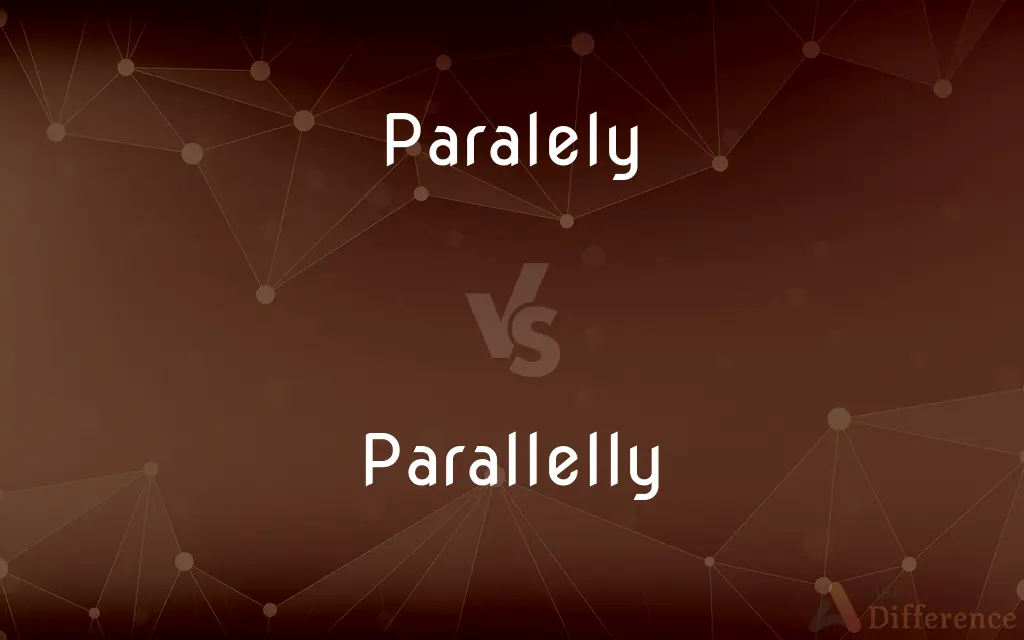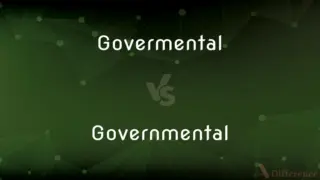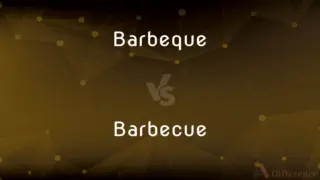Paralely vs. Parallelly — Which is Correct Spelling?
Edited by Tayyaba Rehman — By Fiza Rafique — Updated on March 26, 2024
"Paralely" is a misspelling. The correct spelling is "parallelly," which means in a parallel manner or direction.

Table of Contents
Which is correct: Paralely or Parallelly
How to spell Parallelly?

Paralely
Incorrect Spelling

Parallelly
Correct Spelling
ADVERTISEMENT
Key Differences
Remember "parallelly" has two 'l's in the middle, just like its root word "parallel."
Break it down: "paral-lel-ly."
Visualize two parallel lines when thinking of the word to remember the double 'l's.
Think: "It's paralleled closely, so it has double 'l's."
Associate "parallelly" with "similarly," both ending in "ly."
ADVERTISEMENT
How Do You Spell Parallelly Correctly?
Incorrect: Paralely, he ran next to me trying to match my pace.
Correct: Parallelly, he ran next to me trying to match my pace.
Incorrect: I thought we were working paralely on this project.
Correct: I thought we were working parallelly on this project.
Incorrect: She tried to solve the problems paralely, but it didn't work.
Correct: She tried to solve the problems parallelly, but it didn't work.
Incorrect: The tracks run paralely for miles before splitting.
Correct: The tracks run parallelly for miles before splitting.
Incorrect: The wires were laid down paralely across the floor.
Correct: The wires were laid down parallelly across the floor.
Parallelly Definitions
Simultaneously or concurrently.
Both systems operate parallelly.
In a manner reflecting similar patterns or features.
Their careers progressed parallelly.
In a manner that runs side by side without intersecting.
The two streets run parallelly to each other.
In alignment with or mirroring another.
The two projects were developed parallelly.
In a way that is analogous or comparable.
The studies, conducted parallelly, reached similar conclusions.
(about time) at the same time
We planned parallelly for the three most probable scenarios.
Synonyms: in parallel
(about manner) in a similar manner
(less frequent, about space) in a parallel position or direction, even equidistant
This section of the power line is running parallelly to the railway.
Synonyms: parallel
Notes: the short form "parallel" is more frequent than "parallelly" in this sense, see also fast and fastly.
In a parallel manner; with parallelism.
Parallelly Meaning in a Sentence
The bookshelves were installed parallelly to maximize space.
She walked parallelly to the shoreline, enjoying the sunset.
The two lines were drawn parallelly to demonstrate symmetry.
Parallelly laid tiles give the illusion of a larger space.
In the race, they moved parallelly, neither gaining an advantage.
Parallelly adjusting the mirrors, he managed to see the blind spot.
The runners trained parallelly, sharing tips and motivation.
Parallelly, the software processes multiple tasks to save time.
The dancers moved parallelly, creating a beautiful pattern.
Parallelly to her studies, she pursued a career in music.
Parallelly to his career in law, he wrote novels.
Birds flew parallelly to the coast, migrating south for the winter.
He arranged the lights parallelly to enhance the artwork.
She organized the books parallelly, making the shelf aesthetically pleasing.
Trees planted parallelly along the road create a scenic drive.
The curtains were hung parallelly to each other, framing the window beautifully.
The cars parked parallelly, taking up less space on the street.
Cables laid parallelly reduce interference and improve performance.
By moving parallelly, they maintained a consistent speed.
Parallelly, the company developed two versions of the product.
Common Curiosities
What is the pronunciation of parallelly?
/pəˈræləlli/
Why is it called parallelly?
It's derived from the adjective "parallel," meaning side by side, and the suffix "-ly," indicating manner.
Which vowel is used before parallelly?
"A" as in "a parallelly designed study."
What is the verb form of parallelly?
The verb form of "parallelly" is "parallel."
What is the root word of parallelly?
The root word is "parallel."
Which conjunction is used with parallelly?
"And" as in "simultaneously and parallelly."
Is parallelly an abstract noun?
No.
Is parallelly a negative or positive word?
Neutral.
Is parallelly an adverb?
Yes.
Which article is used with parallelly?
Both "a" and "the" can be used depending on context.
Is parallelly a noun or adjective?
Neither. It's an adverb.
What is the singular form of parallelly?
Parallelly.
Which preposition is used with parallelly?
"To" as in "runs parallelly to."
What is the first form of parallelly?
Not applicable, as "parallelly" is an adverb.
What is the third form of parallelly?
Not applicable.
What is the plural form of parallelly?
Parallelly doesn't have a plural form.
Is parallelly a collective noun?
No.
What is another term for parallelly?
Concurrently.
What is the second form of parallelly?
Not applicable.
Is parallelly a countable noun?
Parallelly is an adverb and not countable.
How do we divide parallelly into syllables?
par-al-lel-ly.
What part of speech is parallelly?
Adverb.
Is parallelly a vowel or consonant?
"Parallelly" is a word containing both vowels and consonants.
Is the parallelly term a metaphor?
Not inherently, but it can be used in metaphorical expressions.
Is the word parallelly imperative?
No.
What is the opposite of parallelly?
Perpendicularly.
Which determiner is used with parallelly?
"This" as in "this parallelly aligned structure."
How is parallelly used in a sentence?
"The two projects were executed parallelly to save time."
How many syllables are in parallelly?
Four.
What is a stressed syllable in parallelly?
"lel."
Share Your Discovery

Previous Comparison
Govermental vs. Governmental
Next Comparison
Barbeque vs. BarbecueAuthor Spotlight
Written by
Fiza RafiqueFiza Rafique is a skilled content writer at AskDifference.com, where she meticulously refines and enhances written pieces. Drawing from her vast editorial expertise, Fiza ensures clarity, accuracy, and precision in every article. Passionate about language, she continually seeks to elevate the quality of content for readers worldwide.
Edited by
Tayyaba RehmanTayyaba Rehman is a distinguished writer, currently serving as a primary contributor to askdifference.com. As a researcher in semantics and etymology, Tayyaba's passion for the complexity of languages and their distinctions has found a perfect home on the platform. Tayyaba delves into the intricacies of language, distinguishing between commonly confused words and phrases, thereby providing clarity for readers worldwide.







































